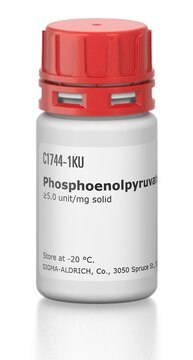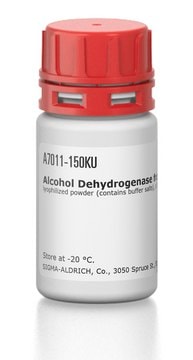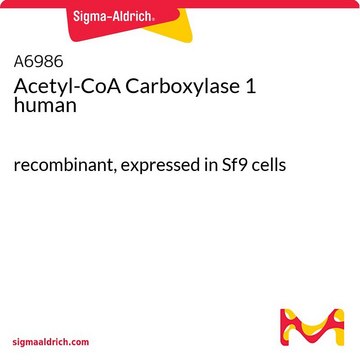P7173
Pyruvate Carboxylase from bovine liver
buffered aqueous glycerol solution, 5-25 units/mg protein (BCA)
Synonym(s):
Pyruvate:CO2 ligase (ADP-forming)
Sign Into View Organizational & Contract Pricing
All Photos(1)
About This Item
CAS Number:
MDL number:
UNSPSC Code:
12352204
NACRES:
NA.26
Recommended Products
form
buffered aqueous glycerol solution
Quality Level
specific activity
5-25 units/mg protein (BCA)
concentration
≥0.5 mg/mL
foreign activity
lactic dehydrogenase ≤0.5%
storage temp.
−20°C
Looking for similar products? Visit Product Comparison Guide
Application
Pyruvate is critical for gluconeogenesis, lipogenesis, glyceroneogenesis, neurotransmitter biosynthesis and glucose-induced insulin, and is used to study these processes.
The enzyme from Sigma has been used as a positive control during the assay of pyruvate carboxylase activity in cell-free extracts of Corynebacterium glutamicum.
Biochem/physiol Actions
Pyruvate carboxylase catalyzes the carboxylation of pyruvate to oxaloacetate. Pyruvate carboxylase is a mitochondrial protein that has a biotin prosthetic group that requiries magnesium or manganese and acetyl CoA.
Unit Definition
One unit will convert 1.0 μmole of pyruvate and CO2 to oxalacetate per min at pH 7.8 at 30 °C.
Physical form
Solution in 50% glycerol containing 0.05 M Tris-HCl, pH 7.4, 2 mM magnesium acetate and 1 mM EDTA.
Preparation Note
Affinity purified
Storage Class Code
10 - Combustible liquids
WGK
WGK 1
Flash Point(F)
Not applicable
Flash Point(C)
Not applicable
Choose from one of the most recent versions:
Already Own This Product?
Find documentation for the products that you have recently purchased in the Document Library.
M L Lazo de la Vega-Monroy et al.
The Journal of nutritional biochemistry, 24(1), 169-177 (2012-07-31)
Besides its role as a carboxylase cofactor, biotin has a wide repertoire of effects on gene expression, development and metabolism. Pharmacological concentrations of biotin enhance insulin secretion and the expression of genes and signaling pathways that favor islet function in
Eunsook S Jin et al.
Metabolism: clinical and experimental, 62(1), 152-162 (2012-09-18)
A three-day high-fat diet induces hepatic steatosis and hepatic insulin resistance in rats without altering fasting plasma glucose concentration or the rate of glucose production. However, as the nutrient profile available to the liver is substantially altered by a high-fat
Pyruvate carboxylase as an anaplerotic enzyme in Corynebacterium glutamicum.
Peters-Wendisch, Petra G., et al.
Microbiology, 143(4), 1095-1103 (1997)
Xiaoxia Yin et al.
Applied microbiology and biotechnology, 96(6), 1527-1537 (2012-06-09)
In previous research, a thiamine-auxotrophic yeast for alpha-ketoglutaric acid (KGA) overproduction was screened in our laboratory and named Yarrowia lipolytica WSH-Z06 (CCTCC no. M207143). However, the high concentration of by-products (mainly pyruvate) limited its application on an industrial scale. To
Helle Mark Sickmann et al.
Neurochemistry international, 60(3), 267-275 (2012-01-17)
The number of people suffering from diabetes is hastily increasing and the condition is associated with altered brain glucose homeostasis. Brain glycogen is located in astrocytes and being a carbohydrate reservoir it contributes to glucose homeostasis. Furthermore, glycogen has been
Our team of scientists has experience in all areas of research including Life Science, Material Science, Chemical Synthesis, Chromatography, Analytical and many others.
Contact Technical Service








